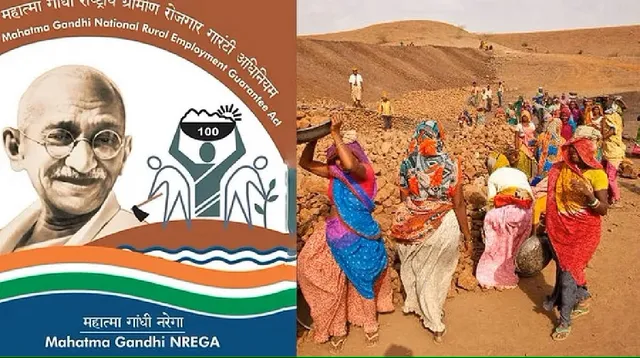NREGS payments: Aadhaar-based system mandatory now, Govt says may consider exemptions on case basis (Indian Express)

- 02 Jan 2024
Why is it in the News?
With the Aadhaar-based payment system (ABPS) now mandatory for payment of wages to NREGS workers, the Government on Monday said it may consider exemptions on a “case-by-case basis” should any gram panchayat face “technical issues”.
What is the Aadhaar Enabled Payment System (AePS)?
- The Aadhaar Enabled Payment System (AEPS) is a payment service that allows a bank customer to use Aadhaar as his/her identity to access his/her Aadhaar-enabled bank account and perform basic banking transactions like balance enquiry, cash withdrawal, remittances through a Business Correspondent.
- It is a service developed by the National Payments Corporation of India.
Key features of AePS:
- Aadhaar-linked transactions: AePS enables Aadhaar card holders to make transactions through their Aadhaar-linked bank accounts, similar to debit/credit card transactions.
- Biometric authentication: Transactions are completed by submitting the Aadhaar number and biometric details (iris or fingerprint scan) at Points of Sale (PoS) or micro ATMs, using Aadhaar authentication.
- Bank account privacy: Users are not required to share their bank account details during the transaction, enhancing privacy and security.
- Fund transfers: AePS allows users to transfer funds between bank accounts, providing a convenient way to send and receive money.
- Secure transactions: AePS transactions are considered safe and secure as they require biometric authentication, ensuring the identity of the user.
- By leveraging the Aadhaar infrastructure, AePS simplifies and secures financial transactions, making it accessible to a wide range of individuals, particularly those who may not have access to traditional banking services.
ABPS Implementation for NREGS:
- Since 2017, the Mahatma Gandhi National Rural Employment Guarantee Scheme (NREGS) has adopted the Aadhaar-enabled Payment System (ABPS).
- This system involves linking workers' 12-digit Aadhaar numbers with their job cards and NREGS workers' bank accounts.
- With nearly universal coverage of Aadhaar numbers among the adult population, the Government of India opted to expand ABPS for beneficiaries within the scheme.
- Payments are exclusively directed through ABPS to the associated accounts, ensuring a secure and swift method of fund transfer.
- Out of the total 14.33 crore active beneficiaries, Aadhaar has been successfully linked for 13.97 crore individuals.
- Among these Aadhaar-linked beneficiaries, 13.34 crore Aadhaar authentications have been completed, making 81.89% of active workers eligible for ABPS.
- In July 2023, approximately 88.51% of wage payments were executed through the Aadhaar-enabled Payment System.
Mandatory Adoption of ABPS for NREGS Workers:
- Initially mandated by the Rural Development Ministry starting from February 1, 2023, the implementation of the Aadhaar-enabled Payment System (ABPS) witnessed several extensions, ultimately being permitted until December 31, 2023.
- As of January 1, 2024, ABPS has become obligatory for NREGS workers, with no further extensions granted to states beyond December 31.
- The integrated approach of ABPS and the National Automated Clearing House (NACH), an interbank system, will be employed for bulk payments, including subsidies and salaries.
- The use of ABPS for wage payments to unskilled workers ensures the seamless transfer of benefits to their bank accounts, even in instances of frequent changes in the beneficiary's bank account.
Exemption Decision in the Event of Technical Issues:
- If a gram panchayat encounters technical or Aadhaar-related challenges, the Government of India may evaluate exemptions from Aadhaar-enabled Payment System (ABPS) requirements on a case-by-case basis until the resolution of the issue.
- This announcement followed criticism from opposition parties, labeling ABPS as a harsh New Year measure that could potentially exclude millions of the most vulnerable and marginalized Indians from accessing basic income.
- The government was accused of "weaponizing technology, especially Aadhaar.
